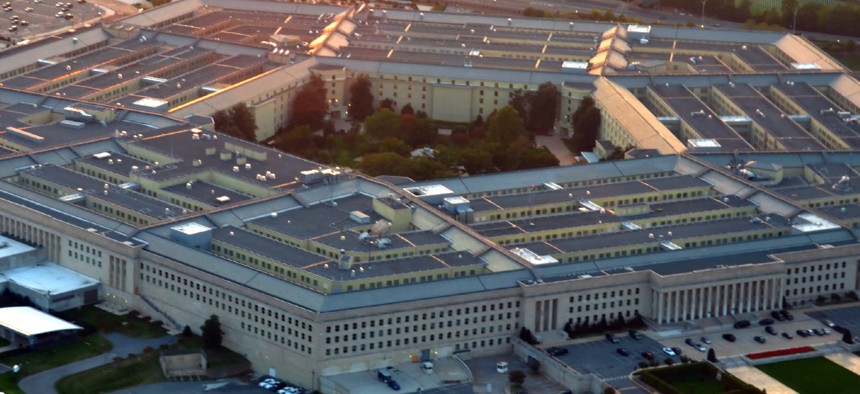Senators Seek to Get Pentagon to Achieve a Clean Audit

icholakov / iStock.com
A bipartisan bill would penalize the Defense Department for failing.
A group of Senators introduced a bipartisan bill earlier this week that would hold the Pentagon accountable for getting its finances in order.
Sens. Bernie Sanders, I-Vt., Chuck Grassley, R-Iowa, Ron Wyden, D-Ore., and Mike Lee, R-Utah, introduced the 2021 Audit the Pentagon Act on Wednesday. This past year, the Defense Department completed its third-ever departmentwide financial audit—30 years after such reviews of federal departments and agencies were required by law. It failed all three, but has made some progress.
“The Pentagon and the military industrial complex have been plagued by a massive amount of waste, fraud and financial mismanagement for decades,” Sanders said in a statement. “If we are serious about spending taxpayer dollars wisely and effectively, we have got to end the absurdity of the Pentagon being the only agency in the federal government that has not passed an independent audit. The time is long overdue for Congress to hold the Defense Department to the same level of accountability as the rest of the government.”
The bill would require the Pentagon to pass a full, independent audit by fiscal 2022. Any department component that fails to do so would have to return 1% of its budget to the Treasury Department to help with deficit reduction.
“We’ve seen example after example of excessive and inefficient spending by the Pentagon, and every dollar squandered is a dollar not being used to support our men and women in uniform,” Grassley said. “After 30 years to get ready, this bill pushes the Defense Department to finally achieve a clean annual audit – a requirement that every other federal agency is held to.”
Since 1997, the Government Accountability Office has been required to do an annual governmentwide audit, but has not been able to give an opinion mainly due to issues at the Defense Department.
The Defense Department said in November that it doesn’t expect to have a clean audit until 2027. That will have been 37 years after audits became mandatory and nine years after completing its first audit.
The proposed bill “would appear to provide a step in the right direction. But it is more symbolic than substantive,” Bill Bergman, director of research at the watchdog group Truth in Accounting, told Government Executive. “If it were in place, the political forces determining department budgets would take it into account, and likely build more into the budget. And DoD departments should be working to raise the bar on the reliability of their financial management for its own sake, not just to try to get a good grade on their annual report cards. Still, symbols can be meaningful, and a step in the right direction.” Truth in Accounting has conducted its own analysis of the three audits the Pentagon has done.
Al Baharmast, adjunct professor at George Mason University’s School of Business and an operations management and information systems consultant, said, “While I understand the clear sense of frustration that is the catalyst of this legislation, I fear that it will not be effective in bringing about its objective [because] the result will almost certainly be a 1% hair-cut on all Defense spending starting in fiscal year 2023 - every program and project will get a trimming.”
Instead, he said, Congress, the administration and Defense Department should work together to address the specific causes that are precluding the department from receiving a clean audit.
“Some of those impediments are clearly in the DoD's hands to address, but they will need the unified force of will, clear-eyed leadership and some more time to fix them; a target date of September 2022 is emphatically unachievable,” Baharmast said. “Yet other impediments are the result of impractical policies levied upon the DoD...It will require a willingness to roll up shirt-sleeves and find pragmatic resolutions to each nuanced problem. Abstract notions of perfection are the enemy of good enough, and frustration, however well-founded, is not a good foundation for resolving these tough problems.”
Earlier this month, Baharmast wrote an article for Government Executive about how Congress and the administration can work together to improve financial transparency and reporting accuracy.
For fiscal 2022, President Biden proposed $769 billion for civilian agencies, a 16% increase over the fiscal 2021 enacted level, and $753 billion for national defense programs, a 1.7% increase.
Progressive Democrats–– such as Reps. Ro Khanna, D-Calif., and Mark Pocan, D-Wis. ––immediately criticized the increase for Defense spending. However they both acknowledged they were pleased the president eliminated the Overseas Contingency Operations fund, which they both deemed a “slush” fund for the Pentagon.
Then on Friday, Reps. Barbara Lee, D-Calif., and Mark Pocan, D-Wis., co-chairs of the Defense Spending Reduction Caucus, led a group of 23 of Democrats (many progressive leaning) in sending a letter to Biden calling on him to “reconfigure”' his fiscal 2022 request to reflect the savings from withdrawing U.S. troops from Afghanistan by September 11, 2021, which could be up to $50 billion.
“Reallocating that funding to domestic priorities and human needs would expand your Build Back Better agenda,” they wrote. “It could end homelessness in the United States, provide increased health coverage to Americans in need, or contribute to the ongoing battle against the COVID-19 pandemic.”
Biden’s full budget proposal is expected next Friday.
Jeff Schogol, senior Pentagon reporter for Task & Purpose, recently published an article titled, “Budget Day is coming! How will the Pentagon waste money this year?” He noted that defense spending has increased 125% since December 2001, shortly after the September 11 terrorist attacks.
NEXT STORY: Quick Hits






